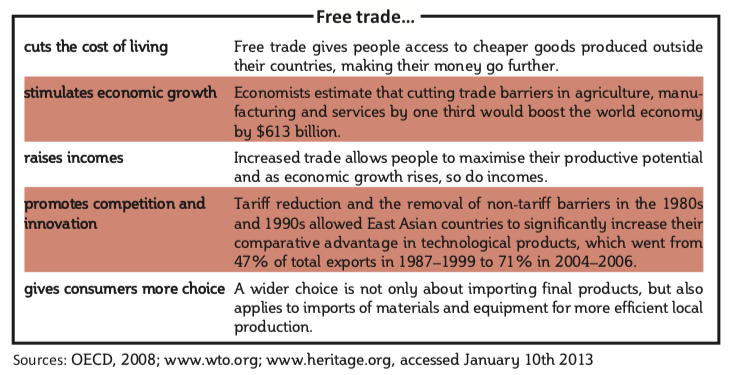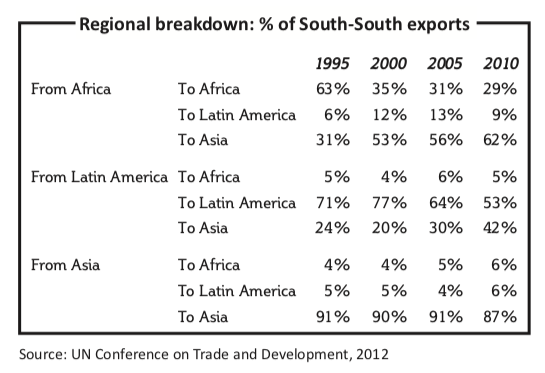Economic freedom trumps political freedom
By GGA Reporter
Ivo Vegter was a finalist for the 2011 Bastiat Prize for Journalism, awarded by the International Policy Network, a non-governmental charity committed to eliminating barriers to enterprise and trade. The prize recognises writing that explains, promotes and defends the principles of a free society. It celebrates journalists whose writing emulates the great 19th century French classical liberal philosopher and politician, Frédéric Bastiat. Researchers at Good Governance Africa decided to challenge Mr Vegter’s free market faith.
What countries have unilaterally opened their markets to trade, and what were the results?
The classic case is the unilateral repeal of Britain’s Corn Laws in 1846 by Sir Robert Peel, when efforts to extract reciprocal agreements from continental trading partners failed. Besides heralding an unprecedented rise in economic growth and material prosperity, it earned Britain world leadership in finance, insurance and shipping, which had all suffered at the hands of a law that protected only the interests of wealthy, politically- connected landowners. Moreover, Britain’s unilateral action prompted the spread of trade liberalisation throughout much of Europe.
A more recent case is that of Chile between 1974 and 1990, which demonstrates the economic benefits of unilateral trade liberalisation. Sebastian Edwards and Daniel Lederman of the National Bureau of Economic Research in the United States provide a good overview. Interest rates declined. The currency at first fluctuated but soon stabilised in a gradually strengthening curve. Industrial exports rose while raw-material exports fell in almost perfect inverse correlation. GDP growth was between 4% and 8% for most years other than the 1982–83 recession, compared to minus 6.2% in 1974– 75. While unemployment at first rose in tandem with trade liberalisation because of sectoral disruption, Chile ended this period with an unemployment rate of 5.3%, down from 13.5% in 1974.

How would unilateral trade liberalisation increase trade among developing countries? Is it not likely that consumers would prefer to buy better and cheaper products from developed countries, which are at a comparative advantage?
I’m far from convinced developed countries are capable of producing better and cheaper products than developing countries. The geographic constraints on many goods and services are lower than in the past but not negligible: witness the success of down- market shops in Africa selling inexpensive manufactures made in the developing world. The Chinese are strong players in this sector, but so are other fast-growing developing countries. Besides raw-material exports and the potential for industrial growth if input costs are reduced, there are already many inexpensive goods manufactured throughout the developing world. The rich world would shun many of these inexpensive products. Even when these goods do not meet unique needs and could in principle be displaced by rich-world imports, they often are not, because of a combination of adequate quality and low price. Comparative advantage for the developed world exists, but it is far from universal.
Unilateral trade liberalisation would remove the bargaining chip of access to markets that could elicit reciprocal liberalisation. Would this remove the potential for greater export-led growth?
Yes, provided that this potential exists in practice, which I do not believe it does. Tariffs and subsidies in the developed world are typically much lower than those in the developing world. The ability to import less expensive raw materials for use by a nascent industrial sector would boost the cost competitiveness of both domestic sales and exports.
The political reality is demonstrated by the failed Doha trade talks. Develop- ing nations have no reason to believe that the developed world will be able to resist domestic lobbies—especially agriculture—without sparking riots in the future. If voluntary reciprocity does not materialise, there is a strong argument for taking the moral high ground and shaming the rich world into opening the markets they now protect. It is useless to retain a bargaining chip for something the other side will not bargain for.
Could opening markets to cheap imports wipe out Africa’s local and sometimes infant industries? What is more important, protecting jobs or securing cheaper goods? Leaving aside the question of comparative advantage in the developed world, which I addressed above, the infant industry argument is not borne out by theory or data. Correlation is easy to find, but causation much harder to show.
There is no reason to believe that governments are better at predicting success than markets. They would need to know which industries could realistically benefit from protection, how long it should last, and its magnitude. Lacking consistent answers to such questions, protection is a practical gamble (if not a patronage racket), rather than a theoretically-sound policy.
Most importantly, it is very difficult to wean industries off protection, once granted. Witness the motor assembly industry in South Africa, which was granted a seven-year protection scheme on “infant industry” grounds in 1995, only to have benefits extended to 2020, a quarter-century on. Ironically, the industry oversaw a 25% reduction in employment despite the protection, which neatly undermines the political motive for granting protection in the first place. (According to Frank Flatters, who conducted a detailed and largely critical study of post-1995 motor industry protection, measures to protect the industry prior to that date were aimed at import substitution rather than exports, and produced a wide range of low-scale, high-cost products.)
It is not clear that protectionist policies have helped industrial nations. Japan, for example, did protect its heavy industries and experienced growth in this sector. However, it experienced much faster growth in a sector that it did not protect, and in which it ultimately built a far greater comparative advantage: electronics. Ultimately, it can thank unprotected industries for most of its economic development.
The development of Germany and the US under protectionist conditions, by comparison with Britain, is also sometimes cited as evidence for this claim. However, Germany and the US had higher labour productivity, adopted mass-production techniques more rapidly, and their labour moved quickly from agriculture to industry. Though Britain developed its industries before the US and Germany, this was no longer a comparative advantage by the time the latter two began their rise.
Industrialised countries that developed behind protective tariffs would have grown even faster if they had not wastefully diverted resources to protectionism, argues Stephen Broadberry in a December 1993 paper published in The Journal of Economic History.
I do not believe that people living in developing countries are less capable than anyone else. However, they may labour under other geographical, climatic, historical or political constraints. Even if there were cases where the comparative advantage of a country is low across all sectors, access to cheaper goods would still benefit those who choose not to migrate. And this would be true even in the worst-case scenario in which the economy of the holdouts (those who chose not to migrate) is limited to poor and rustic agrarianism.
If the benefits of South-South trade outweigh the benefits of South-North trade, would it make sense to reduce trade barriers only between countries at a similar level of development?
That would indeed be a good start, and in any political negotiations on the subject of trade, this might be a compromise worth considering.
However, Jagdish Bhagwati, the editor of the 2002 book called “Going Alone: The Case for Relaxed Reciprocity in Freeing Trade”, argued that “there is an economic case for reciprocity in freeing trade.” But if other countries do not follow “it makes sense to go with unilateral freeing of trade,” he said. “Such unilateral freeing of trade can, and occasionally will, trigger a reciprocal response, implying what I call sequential reciprocity.”

This latter case is what I mean when I refer to taking the moral high ground and shaming the rich world into dropping their remaining trade barriers.
So even in North-South trade, unilateral action would produce some level of gain, which would be sacrificed if the developing countries waited for simultaneous reciprocity from the rich world.
If developing nations adopt rapid unilateral trade liberalisation, they risk recession, steep declines in output, and increases in unemployment as experienced by other countries that followed this “shock therapy” approach (e.g. Eastern Europe). Would not a gradual approach (including reciprocal liberalisation) better protect industries and jobs and ensure development?
This is a fair fear. There will undoubtedly be a degree of adjustment needed and such adjustment can be traumatic.
Some workers in previously-protected industries will have to improve their productivity or find other work for which they are not at present qualified. This will hurt some. The end of their protection, however, will benefit far more people and restore an unjust system to one that treats everyone equally. This will, of course, be cold comfort to the affected workers.
The business sector should therefore realise the need for retraining displaced workers and invest in the requisite programmes to supply this need, if only to ensure the competence of their own future labour force. Greater corporate involvement is needed in education, including a return to trade and artisan apprenticeships, particularly in the context of failing government schooling.
The political consequences of shock liberalisation may be politically poisonous as people fight for their jobs despite lower prices for consumables. A possible reversion to a more closed system could not only lead to political instability but also investment forfeits from those who had invested under the assumption that trade liberalisation would be sustained. Under these circumstances, is gradualism not a superior strategy?
I am not convinced that as a matter of policy the fight by a few for their (unfairly derived) livelihood ought to outweigh the broader, though less intense fight for lower prices. A shrewd political leader ought to be able to make the case that in public policy, special interests should not trump the general interest, no matter how loudly the special interests complain, or how sympathetic one might be to the particular special interest in question.
Admittedly, this is exactly the problem facing France and its farmers, so moral idealism is trumped by hard political reality even in developed countries. However, as in the cases cited above, trade liberalisation certainly is possible, even if undertaken without reciprocity, and even against the opposition of those who stand to lose their unjust protection. The political coalition-building and compensation programmes that Chile used to achieve liberalisation, as documented in the Edwards and Lederman paper I cited above, make a good case study.
In under-developed countries the political risk of free trade is high due to an inelastic labour market that has not developed a diverse labour profile. In such situations, a “strongman” (such as presidents Paul Kagame of Rwanda or Uganda’s Yoweri Museveni) may be the only system of government that can withstand the initial economic shocks. What takes priority: free trade or free people?
This is a fascinating question that really deserves a far longer answer. Over time, and noting that I learnt a deep appreciation for political freedom having witnessed the liberation of South Africa as a student, I have come to the conclusion that if given a choice between economic freedom—the right to work, produce, and trade without undue taxation or iniquitous licences—and political freedom—the right to elect those who would be constitutionally bound to protect life and property—I would choose economic freedom.
Most of the liberties that make a people free are economic in nature. Political freedoms are never ideal and absolute. A democracy, for example, sounds like freedom, unless you are part of a culturally distinct but voiceless minority. The tyranny of the majority can be just as oppressive as the tyranny of a strongman.
Many advocates of free markets, in the absence of a sound constitution guaranteeing the economic liberties they seek, have advanced the notion that a so-called “libertarian dictator” might be a better political alternative to democracy. Chile, again, is a case in point: it threatened to become a first-world country thanks to economic liberalisation, even under a harsh military dictatorship. Although it is arguable that discontent with temporary disruption is easier to suppress with a jackboot, I would not go as far as to say this is a preferable scenario. I would, however, concede that economic freedom trumps political freedom, in the unfortunate case where a choice must be made.



